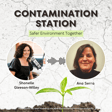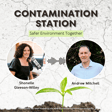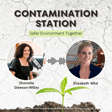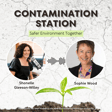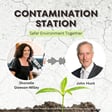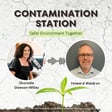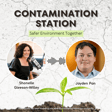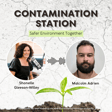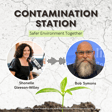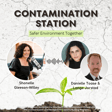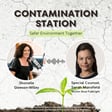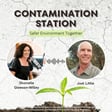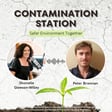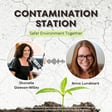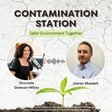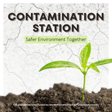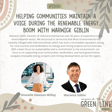Introduction to the Podcast & Guest
00:00:01
Speaker
Welcome to Contamination Station, safer environment together, a New South Wales EPA funded podcast. In these episodes, you'll hear from those working to implement contaminated land policies and procedures at the local level by sharing our stories, frustrations, wins and losses. Our aim is for this podcast to become a repository of information that will support those currently working to combat contaminated land and for those yet to come.
00:00:30
Speaker
Hello and welcome to this episode of Contamination Station, Save for Environment Together, an EPA-funded podcast. I'm your host, Chanel Gleason Willy, and our guest today is Noel Schiller, one of the Canberra Region Joint Organisation contaminated land managers. The views and opinions expressed in this podcast are solely those of the host and the guest as individuals, and do not necessarily reflect those of the New South Wales EPA or any other organisation.
Program Focus and Noel's Experience
00:01:00
Speaker
In this episode, we're talking about the lessons learned in delivering three years of the EPA funded council regional capacity building program for the Canberra regional joint organization. Noel Schiller has worked as the contaminated land project manager since the funding was first granted in 2019 and has many stories to tell. Hi, Noel. Thanks so much for your time today. Thank you for having me, Chanel.
00:01:24
Speaker
So this podcast is aimed at helping those working in the space of implementing contaminated land policies and procedures at the local level. Noel, can you tell us a bit about your professional background and what aspects of managing contaminated land you've had experience with?
00:01:41
Speaker
Well, I guess I'll start by working in reverse, Chanel. So in 2019, I joined the Canberra Region joint organisation under the CRCB program, which is a state government and local government joint summit.
00:01:56
Speaker
program, aimed specifically at transferring the regulatory responsibilities of UPSS and contaminated lands across to from state to local.
Regulatory Responsibilities Transition
00:02:07
Speaker
UPSS obviously being the ground petroleum storage systems which I'm not going to say every time.
00:02:13
Speaker
We all know that we operate these days with four letter acronyms. There'll be plenty of those in this chat today. But I came into that role on the strength of my sort of bank of knowledge in local government where I spent over 20 years since the sort of the early to mid 90s.
00:02:30
Speaker
in regional New South Wales. I'm from the town of Yonge, the Southern Tablelands in New South Wales, and I work for Yonge Shire Council, which is now Hillponts, and Cara Shire Council in the environmental departments there. At various stages along my career path too, I had had a brief stint in both oil and gas in an environmental level, which was very valuable and interesting to everything else I'd done to compliment that.
00:02:57
Speaker
And look, I have a history in the agricultural sector. So I'm from a fifth generation farming family out here in the young region, Broadacre Farming.
00:03:06
Speaker
which was my childhood and my younger years of my life, the learning years. From that, I did a trade course in greenkeeping in my local town, which is very much like a small scale version of farming. So that was my life in the early years. And I guess the knowledge I picked up there sort of complimented me every time I applied for roles in government. As you know yourself quite often, it's not only your academic knowledge, it's your on the ground and life knowledge that helps.
00:03:36
Speaker
So I guess that's what has got me to where I am today in this role. By no means of what I class myself as an expert at anything, but I guess it'd be fair to say I have sort of a good working knowledge of a vast amount of areas in environment.
Addressing Knowledge Gaps
00:03:50
Speaker
Yeah, definitely. Sounds like it. A good broad overview is always good because you can then, I guess, specialize in the different areas such as contaminated land. So when you took on this role, how much knowledge did you find was already embedded in your councils around managing contaminated lands and putting those potentially contaminated lands through the planning process?
00:04:19
Speaker
Well, as far as councils go, and I guess I'll talk mainly about regional councils. I mean, in local government, I should say, I'm not as burst in the metropolitan side of the government. It's all been in regional. But I do know in regional areas, councils did not have any regulatory role in contaminated land or UPSS since 1998.
00:04:42
Speaker
Council were involved prior to that, so when this program was approved and adopted in 2018 and then kicked off in 2019, there'd been a 20-year gap from when Council's had been involved in this sort of work.
00:04:58
Speaker
until I came along and my cohorts around the states in all the various JO regions. So I guess it's fair to say in that period of time, it's like anything we do, if you're not practicing something or looking at it regularly, you just tend to forget about it no matter how competent you are. So Councillors are faced with 20 years of dormancy on the matter.
00:05:17
Speaker
So a lot of knowledge was gone and in local government councils too, it's a bit of a revolving door of staff turnover and so forth. So obviously people that would have done the role had since moved on. I did find a few of my sort of remote smaller regional councils did still have an officer or two that could remember.
00:05:38
Speaker
pre-1998 and had a little bit of a knowledge, but it was a matter of re-teaching them all, not so much refreshing them, but starting from scratch again. So we came up with a training strategy with the EPA that we rolled out to the councils and we treated very much that they had no knowledge at all. We thought that was the best way to do it.
00:06:00
Speaker
start from scratch again. In saying that as well, quite a lot of legislation had been updated since then. So it was an obligatory requirement of us to treat it that way too. Yeah. And what sort of training did you find worked best? Well, to start with, we were starting without a plan in a lot of ways. Well, I mean, we did have a good project plan, but once you get out in the cold face, it can change a little bit.
Impact of COVID-19 on Training
00:06:25
Speaker
To start with, we sent out some survey forms to all our councils to try and collect a bit of an idea of where they were at. So I speak in my area of the Canberra region, so our councils, 11 councils we had there, and they buried from large regional centres such as Wobba Wobba, Goulburn and Queenbyan.
00:06:43
Speaker
who had a larger volume of staff, and therefore the knowledge was always going to be a lot stronger, down to some of our smaller councils, such as Kiltoq, towns like Yonge, Burrowahard, and Yass, Chermott, in those smaller regional councils. So we had to run the barometer over all these councils, and we sort of approached it with a mentality that we can't manage, but we can't measure. So we got an idea of what they all knew, or they didn't know,
00:07:10
Speaker
We were very obliging in the way we did that. We weren't trying to put them under the spotlight. We encouraged them to tell us how they think they would be best trained and from that we formulated the package and put it together. And yeah, we thought we had some but just with that.
00:07:25
Speaker
Yeah. And was that mostly, I guess, face-to-face or did you use, I guess, guest experts or online training? We did this name and had a lot of face-to-face that we delivered, but then after that we went to more a mixed bag approach of different experts in different specific areas under UPSS and CLM. Is that kind of what you did as well?
00:07:50
Speaker
Yeah, well, initially we went out to the regions. So I guess it's fair to say at this point that, and I speak only from what I experienced, maybe other officers in my position can relate to this, but it's never a smooth transition from state to local when regulatory responsibilities or anything's being handed down. There's a bit of a mentality, I guess, or I should say,
00:08:18
Speaker
in local government, it's never overly welcomed, and it's probably a legacy from the bought amalgamations, that's what I observed. Go back to 2016, quite a lot of regional councils were put into source amalgamations by state government, which didn't go down too well always, not always a happy marriage. So we're coming into this
00:08:42
Speaker
already maybe hostile environment, you could call it, trying to advocate the benefits of a project that's being handed from state down to local. So it wasn't overly embraced, I guess would be the way to say it. So we very tactically and
00:09:00
Speaker
strategically had to work out a way to have them embrace that. So yeah, there were challenges there. So we initially went out to the councils. We didn't want to do it as a Metro based handing over to regions. So we were the overarching body and our presence and our advocacy was crucial at that time. And it was working quite well. We were conducting training workshops and information seminars at councils in all our regions. And that was working really well until COVID came along.
00:09:30
Speaker
So obviously we could not get out into the regions. And so we had to sit down again, come up with another approach. As we know, everyone went online in COVID.
00:09:39
Speaker
So we approached it from an IT point of view and I guess it's amazing how things can sometimes work out for the better when you're not even prepared for them. So doing it online probably got us better coverage. It allowed the remote councils or the regional councils to approach us when it suited them rather than us arriving out there and having to make them accommodate us.
00:10:04
Speaker
And once everyone got familiar with working online, we got a fairly good coverage of our training. We did bring some experts on board and we created some podcasts and sort of live access trainings, scenarios and so forth. That worked out quite well, but it was strange though it wasn't the initial project plan. And I guess we weren't alone in that. Everyone across the state, across Australia or the world for that matter, had to adapt to the new way of training.
00:10:34
Speaker
So I guess it put us to the test, but the council responded quite well. Yeah. And what was it that the councils were telling you that they really wanted to understand? I guess what were the biggest issues?
00:10:47
Speaker
So we streamlined it down to the important parts, I guess, like anything you're doing at PACE to read the instruction manual before you put your IKEA furniture together, so to speak. So there was a lot of legislation that had been updated and there'd also been regulation brought out, the professional environment of the operations regulation for UTSS. That came out in September 2019.
00:11:10
Speaker
We had a whole new rule book to operate under. And I guess in situations like that, the hardest part is convincing people not to go by the old way, we're all creatures of habit. And we had to roll in this new legislation that they weren't totally familiar with. The terminologies weren't always so easy. So on top of that too, we had to bring in a whole new set of safety procedures, compliance, the regulations and so forth for planning and building regulations and environmental matters with council.
00:11:40
Speaker
So yeah, it was, the heads went back in the books to start with. That was our first approach to the training. And then we eventually rolled in some on-site practical demonstrations and so forth. But we just wanted to make sure that everyone was consistently up to a working level with the legislation. And that was probably the most challenging part, yeah.
00:11:59
Speaker
Okay. So was it at that point more theoretical academic for a lot of the councils or were they actually actively dealing with a lot of contaminated or potentially contaminated sites? I know UPSS is a different kettle of fish. They're always dealing with a lot of those, but when it came to contaminated sites, were they actually dealing with many at that point?
00:12:24
Speaker
Yeah, well, they've always been there. A contaminated site didn't sort of appear with the advent of this project at all. But prior to Council becoming the regulator, any such matters in a planning or building situation, they would relay that onto the EPA, the NSW EPA, and they would act as the regulatory authority.
Fuel Leak Incident & Program Inception
00:12:45
Speaker
So councils were now in a situation where they had to take that role on and had to gain an understanding of the Australian standards around UPSS, which relates to the design, the installation, the operation. That's something they hadn't done before. And now a lot of these standards and regulations and even the legislation
00:13:06
Speaker
I guess it's all cut from the same cloth in a lot of ways, but it is still different in enough of a sense that it does require attention to learn. You can't just sort of wing it. So we're very thorough in the way that we rolled that out. I guess too, in certain situations, I guess when we talk about our three-tiered system of government here,
00:13:28
Speaker
The other states in Australia all have slightly different regulations and legislation. So we have offices at councils that, and maybe near the state in New South Wales, West Australian, Queenslanders, they had their own spin or their own take on how this was interpreted. So we did have some good input from the officers from what they knew, but also some of them, we virtually had to wipe the slate clean with them again and say, no, this is the new way it has to be done.
00:13:58
Speaker
Look, they were all really, really good. They understood that it was going to be their responsibility. And then we had to help them gain an appetite for the fact that this is where it was heading.
00:14:08
Speaker
Yeah, sure. Okay. And so why was it important for them to understand these things for their everyday job? What sorts of council offices, for instance, were you actually dealing with? Well, I guess the answer to the first question is the importance of it. So I'll just backtrack here for a little bit. So back in sort of 2015 and 2016, prior to this project being rolled out,
00:14:35
Speaker
There was a particular incident in Northern New South Wales at a council. I won't mention the council. I don't need to go into the total ins and outs of it, but there was a small regional village of about 200 people that relied on groundwater extraction for their personal usage.
00:14:53
Speaker
Anyway, this particular village, as much like any you would see around the state, I'm sure everyone's been through these places where there's sort of one service station, a small police station, an original school, and a shop of two. So this particular township that relied on its groundwater, the local service station, which probably been there for 50 years or so, an old, outdated legacy site.
00:15:13
Speaker
The underground tanks failed and they spilled about 400 litres of fuel into the underground aquifer. Now that was only identified when the residents of this particular village whilst watering their gardens and using their water noticed an odour in the water. Then they noticed it was starting to kill their lawns and their plants and so forth. So it became a kind of serious matter. The council that was the local council at the time came out and did an inspection and the EPA were called on board
00:15:43
Speaker
And it became a major incident, a major health incident. And the result of that was that a case study was put forward and it was acknowledged or understood from there that a lot of these old service stations that were put in in the 1950s, 60s, 70s, steel underground tanks, they were starting to fail.
00:16:03
Speaker
their integrity testing. So I guess it was a matter of foresight then to realize, well, this is the first incident we've had. This is gonna be one of many. They're all gonna start failing consistently around the state and some numbers were crunched and it was worked out the effect that this might have on it. So from there, it was decided that rather than try and manage this from a state approach, it would have to be streamlined down to council's local government level, where it'd be better managed.
00:16:29
Speaker
So that was the, I guess that was where this project was born, was born from an incident, an environmental incident, which sort of prompted a proactive approach. They so often are, aren't they?
00:16:42
Speaker
Yeah, I guess so. Look, a lot of what we do is reactive at the time. But this little incident, just to put some numbers to it, 400 liters of fuel, which is basically a large wheelie bin of liquid, if you want to view it like that, spilled into underground aquifer. That water cannot be used for extraction and human use indefinitely.
00:17:07
Speaker
So the EPA and the local government councils had to retrofit all the houses in that town. And I think there was maybe 120 houses or something to that effect. Don't quote me on that. They had to put a water tank and a pump.
00:17:23
Speaker
on all the houses to get them a water supply. And I think even now to date, they're still working on a pipeline from a water supply to a neighbouring council. But at the time, the immediate reaction response and cleanup bill was up around $800,000. That was just to get a water supply back to that village.
00:17:42
Speaker
So 400 litres of fuel, $800,000 doesn't take much. Thankfully, it was only a small single tank station. If you could visualise that happening on a major service station that made a dozen underground tanks in a heavily populated area that just sort of start to snowball the costs and the damage effects. So yeah, that was what prompted this entire program. It was probably the catalyst for the decision being made to meet this problem head on.
00:18:10
Speaker
Yeah. So that's, I guess, definitely shows why it was so important to commence the program. And I'm guessing that you and as part of the incident, the environmental health officers were involved in that one and the whole compliance team, I guess. Is that what you found with your councils as well, that those were the main people who were attending your training and really wanting to get involved and upskill in this area?
00:18:38
Speaker
Yeah, exactly. I couldn't put it better. I guess regional councils too, they all communicate. They're sort of as localised as they are. They do have a lot of cross-border type involvement with their neighbouring councils. And when the effects of this occurred in all the New South Wales, it did take long for it to filter down to the other councils. And when you're looking at the financial status of our regional councils, we really do struggle.
00:19:06
Speaker
knowing quite well that an incident of such monetary effect is what the one was I spoke about.
Proactive Regional Councils
00:19:14
Speaker
They're probably looking ahead going, yeah, well, this could be us next. So I found that when I started our training programs, most of the regional council officers had heard of this event to some capacity. Some were quite well versed on it. They'd looked right into it.
00:19:27
Speaker
And I guess it's the same in any industry that anyone works in. If there's an incident somewhere that's put you in a situation where you think that could be me one day, you do tend to put a bit of extra focus and attention on it. So it was, if I dare say it was maybe the type of thing that was needed,
00:19:44
Speaker
to, certainly not needed by the people who lived in the village I mentioned, but sometimes an event like this is what is needed to address a larger problem on a longer term scale. It's certainly not ideal, but if you were to approach this in capturing lessons learnt and future sustainability, there was a lot of value out of the incident in Northern New South Wales. And I think all we can do is take positives out of something after the event.
00:20:14
Speaker
Yes, it's unfortunate that a lot of the CLM-related catalysts for the industry have happened in northern New South Wales. Yes, yes, that's well. I'll take your word on that, Chanel. But I guess, too, just to go a little further on from that, it was a good opportunity to create some focus and teach the regional council officers
00:20:37
Speaker
a lot more about the petrochemical industry when we talk about UPSS. Because it is a volatile industry that has the potential to cause all sorts of health hazards and community risks. And I personally see it's right up there, I guess, with the knowledge that we now have on say, asbestos and lead paint and PFAS will be another one that gets a lot more focus too.
00:21:05
Speaker
Those are the things that have long-term effects and the regulatory authorities and councils really need to have as much knowledge as they can. Definitely. So you spent the last three years delivering this program or thereabouts. So I'm sure that you have had many successes and maybe some not so successful events or training sessions or meetings.
State-Local Government Dynamics
00:21:28
Speaker
What's the biggest thing that you've learned by delivering this program?
00:21:33
Speaker
So it's really enlightening to go out into regions and work with the people who I guess are at the cold place of their own challenges. So I guess without being the devil's advocate here, there's not a great deal of the relationship between state and local governments.
00:21:53
Speaker
Uh, it at times can be a little bit strained, you know, sort of, there's, there's a bit of an attitude as big brother, little brother, which, which I guess we all see. And, and this was relayed to me in every time I went out to a regional council, we had a lot of positive feedback. We also heard a lot of grievances and so forth. And, and, and I was, there's nothing like the good folk of regional New South Wales to say it like it is, but that's what I've found. So.
00:22:18
Speaker
I soon got told about a few analogies and sayings from regional New South Wales such as the old classic that New South Wales stands for the Newcastle, Sydney, Wollongong and us people out in the country don't exist, which quite often said tongue-in-cheek, but you do see
00:22:36
Speaker
You do see a lot of merit in what they say in these regional areas and also a lot of questioning too in regards to the handling of funds and grants and so forth from a state government level to a local government. I guess they're at the end of the queue. I did have one general manager tell me an absolute perler of an analogy. He said that.
00:22:57
Speaker
the three-tiered system of government in Australia, it compared it to a multi-lane highway. He said that local governments, the slow lane in the left, state governments, the middle lane in the highway and federal's the express lane on the right. And he said that's how the progress and the tension of the funding is distributed.
00:23:17
Speaker
And yeah, I have to listen to people when they say these things because they're working in these environments at all times. So probably in answer to your question in the roundabout way, probably the biggest thing, the challenge I had with councils is the fact that local governments are quite well aware of the fact that the filtering from the top to the bottom will always come to them last. And that's not a negative thing, I guess, but they're well aware of that.
00:23:44
Speaker
There's a strong belief in local governments that a lot of the shifting from state to local in regulatory roles is not met by the cost distribution. So we face challenges from the start of this project. There are numerous challenges. You throw in COVID, you throw in fires, floods, drought in regional areas. All these impacting effects
00:24:10
Speaker
do take the shine off what we're trying to do here and it sort of pushes the priority of it back some
Unique Environmental Challenges in Regional Areas
00:24:15
Speaker
more. And it's interesting, you go to a regional council and even something as simple as we've all witnessed in the last 12 months, the condition of the state's roads due to the weather situation. That has such a huge impact on how councils operate and how the ratepayers in the region run their lives and their businesses.
00:24:34
Speaker
So we're dealing with challenging situations, and I think that's probably the best way I could describe it. Life in regional New South Wales probably isn't as smooth as what you'd have in a metropolitan area, but that's the beauty of it. I guess that's why we all love living out in the regional areas. But yeah, so trying to establish that pathway from the state to the local was a challenge. But in saying that to the EPA and our state government stakeholders are very supportive all along.
00:25:04
Speaker
And yeah, we eventually got some great results. And I think it's at the stage now where contaminated land and UPSS has been embraced by councils. And they now understand that for the benefit of their own communities and public safety and environmental safety, it is best managed in their own backyard rather than from a state government body in a regional city, you know, a vast distance from where they are.
00:25:28
Speaker
Yeah, definitely. And the programs were, well the funding was all allocated to joint organizations or regional organizations of councils. So amalgamations, like groups of councils working together. Do you believe that was, you know, a benefit for it to be rolled out that way?
00:25:48
Speaker
I think so. So the creation of the joint organisations are originally called regions of councils or ROCs. That was what they were called not long prior to this program being rolled out, but they were changed to joint organisations or JOs. And the simple maths behind that is that I think there's 134 councils in New South Wales, local government councils, and the ability for state government to function for 134 councils
00:26:15
Speaker
individually limits their time. I guess if you look at the amount of days in a year, as opposed to 134 councils, the State Government only gives about two days of focus on each council. However, if they can get them into a group in the one room with other councils, they can spend longer time with them, they get a broader outreach of knowledge from
00:26:37
Speaker
a collection of mayors, general managers, professionals in councils. So I think it does work. The logistics of it is always challenging. But the benefit is now that it brought focus out into regional areas. So a lot of the JO forums and meetings that were once held in pollen areas are now being brought out to
00:27:00
Speaker
and some of our larger centres. So it's bringing attention from state government out into the grassroots of the local government, which I think is a great thing. And to use my GA region, which is Canberra as an example, we have
00:27:15
Speaker
11 member councils. We're going from the western shelf of Sydney, Windger-Caribbean, southern Highlands, down the coast, out into the broad-acre agricultural areas around Yass and Hilltops and the Riverina down to Walgore and up into the Snowy-El Point area. So we really do have a good cross-section of councils that varying demographics and geographics and it just it brings a lot of knowledge into the one room.
00:27:42
Speaker
And I guess it also brings some economies of scale with programs like this that you are rolling it out once to 11 councils at the same time. So you don't need 11 people to deliver it. Yeah, that's right. And it helps to bring some consistency, I guess, to the legislation, the policies and the procedures that we're creating. Yeah. And I guess an example of that is that when we talk about UPSS, which has been probably the focus of this conversation,
Program Success and Standardization
00:28:11
Speaker
Quite a lot of service stations that are owned by conglomerates or corporations, they don't just have them in the one council area, they might have them in numerous parts across the state. So if every time they are managing that particular service station, if they're dealing with a different set of regulations, policies and procedures for each individual council, it becomes very confusing for them. So this has created some degree of consistency.
00:28:39
Speaker
And we've also attempted to make it a statewide consistency with the other JOs. And people experience that, not just in contaminated land. I think if you spoke to any council regional planning or environmental officer, they would tell you that
Case Study: Vineyard Contamination
00:28:58
Speaker
anything from food shop inspections to companion animal registration to building requirements they differ slightly in each different council area and anyone new to that area is not familiar with that has to adapt so yeah creating consistency is a big thing.
00:29:17
Speaker
So are there any case studies of actual sites or I guess examples that you can tell us about from your time in the role? I know some of you won't be able to share, but is there anything that you can share?
00:29:30
Speaker
Yeah, look, there's some interesting ones. It's been a wonderful ride to me, if I can use that term. I've got to witness and experience some things in my line of work that I hadn't up till that point. So, look, there's one particular interesting one I could mention. This occurred down in the Riverina.
00:29:49
Speaker
Obviously, I'm not going to mention towns or places or anything like that. That's not important at this point, but the principle of what I'm about to tell you is probably the important thing. I was called to give some consultancy to a rate payer who was an orchardist. He had a vineyard. The vineyard had been the family for four o'clock generations. It had a pretty good reputation, quite a large vineyard.
00:30:14
Speaker
Anyway, this was only just last year, way through 2022, and as we all know, the flooding and the heavy rainfall episodes that we had across this day were sort of the worst in decades. Anyway, this particular orchard has irrigated his vineyards from groundwater.
00:30:34
Speaker
And I'm certainly not an expert on wine or wine making, but apparently the quality of the water is paramount to the end result, the quality of the product. So this particular fellow, he would conduct water sample testing on his bores at his vineyard, you know, two or three times a year, I suppose, in the changing cities, and it's just to monitor the quality and the integrity of the water.
00:30:55
Speaker
And late last year, after the rainfall events, he got in touch with me and said, look, I've got some drainage readings in my water samples that I've never had before. They're not alarming, but they're just different. Maybe I could help out and give some insight. And as it turned out, some further tests were carried out, a bit more extensive, and we traced it down to the
00:31:17
Speaker
What he was finding in his water was some trace elements from horticultural chemicals that hadn't been used on his farm since about the 1960s. Wow.
00:31:27
Speaker
So it was interesting what that prompted for me. I looked a bit further into it and it was a clear result of what we call contamination migration. So what happens is obviously in a farming situation, you spray on chemical and products onto your paddocks or your crops. It does retain in the soil to a degree. In this day and age, chemicals and agricultural products are created in a more biological friendly way that they don't have a lasting effect. But some of the older chemicals
00:31:56
Speaker
certainly did hang around and they can suspend in the soil or do a low in rock shelf whatever it may be and they'll sit there and do no harm and then we have a rainfall period like 2022 where the water table was lifted or record high and it can bring it to the surface or it can even just unsettle and disturb it again and then it will migrate
00:32:16
Speaker
travel through the underground aquifers. So I might add that the levels of contamination that were detected were not of a critical or alarming level but it just illustrated a really clear point that what can be happening with sort of
00:32:32
Speaker
effects from other nature in a situation like that. So that was probably one of the most interesting ones that I came across. And it just showed that the need for us to, I guess, be more vigilant in the application of situations like this, whether it's in the petrochemical fuel industry or the broadacre agricultural industry, or even just the building and construction industry, the products that they use,
00:32:57
Speaker
It just underpins the fact that we ought to be more conscious of how we use them where they end up and what the end result of that is because the results are never shown until further down the track.
00:33:09
Speaker
Yeah, and I guess it just highlights the importance of programs like this across lots of different areas in that, you know, this mama had a resource to call on in you and you were able to work through this issue and come up with an answer to, you know, why he was finding these levels.
00:33:28
Speaker
And yeah, it might have ended up being nothing with what he was detecting at that point, but I'm guessing that it's probably resulted in him doing more frequent water testing for the time being anyway, because obviously there's a potential for that to have been the more dilute parts and there could be a more concentrated plume.
00:33:49
Speaker
somewhere just waiting to come through. So these types of, I guess, lead indicators are really useful for people to understand what's actually going on and then put in place some strategies to monitor and potentially, I guess, manage that. So coming from a point of being educated, which is fantastic.
00:34:11
Speaker
Yeah. And I guess in that particular example that I gave, we were talking about a businessman, a farmer who was, who was extremely vigilant, doing tests all the time. So, so he was probably an example of how it's best done. As soon as one concerning test result came back, he was onto it. However, I tend to view it in the other way that it took her to the other end of the scale in a similar situation where they might not have been so vigilant in their testing, or it could be someone who's just bought a farm or a property or an orchard.
00:34:41
Speaker
and they haven't had it as long. And these sort of practices probably aren't undertaken quite as well as they were in this particular one. But yes, I agree totally with you. This fella, he got hold of me through his council. So three or four years ago, that wouldn't have been an option. So it just proved, I guess, that as a resource, we are being utilized. We've been implemented into councils and we are being utilized.
00:35:09
Speaker
And I would imagine that our accessibility will spread. It'll be advocated through people such as the Vignon operator. And that's what we're hoping for. We want to create a presence. We will then step back from councils and they will be the regulators. And we're hoping that we leave them at a better state than what they were when we arrived. Yes, most definitely. So is there anything that you would have done differently throughout the last three years in the way that you managed this program?
Future Program Improvements
00:35:42
Speaker
And look, August.
00:35:45
Speaker
I guess without trying to sound too diplomatic, I would suggest if we were starting this programme over again, despite its great success, and if we were looking to create an even higher level of success, I think there needs to be probably a greater understanding or stronger rapport with state governments, stakeholders and the regional government stakeholders.
00:36:15
Speaker
A lot of governments take hours and I'll say that with with total understanding to
00:36:23
Speaker
simply for the fact that metropolitan and state government is operated and managed more from a metro centric point of view. And I think it's important to understand that when some of our project plans are written, the things that aren't considered, and it quite often can't be considered, but should be in light of what we've been through in the past three or four years. And I speak, of course, like I mentioned before, flooding, fire, droughts,
00:36:51
Speaker
country roads that are unusable, regional councils and regional communities that are isolated through one way or the other, and how this impacts on the communities. And I say that too, not just totally going into bats for local government in regional areas, but in saying that it's probably very difficult for regional councils to understand the operations of a metropolitan local government council.
00:37:18
Speaker
and the challenges they face. So I would think it's probably a good idea in future if these programs are rolling out again is to really buttress up the networking and the rapport between the two bodies prior to rolling it out within the committee. You really need to have state government and local government singing from the same song sheet. You're not singing poorly, you're singing very clearly. That is some very good advice. Yeah.
00:37:46
Speaker
Well, thank you so much for your time today, Noel. It's been really, really wonderful talking to you. Are there any parting words that you would like to say? Look, I guess these projects and programs are introduced in stages, but the long-term value of them is immeasurable. So this was a four-year program.
00:38:06
Speaker
but it will obviously roll on and be continued in some format indefinitely. It wasn't just rolled out for this four year period and then put in the closet, I suppose. So even when I'm no longer involved in this, I would hope that the next lot of project officers and environmental officers have come along.
00:38:25
Speaker
can pick up and continue on where we have. I think there's a stronger focus these days, I guess, on environmental matters. I look at my own experiences in life.
00:38:37
Speaker
And without mentioning my age, I sort of grew up in the era where in household rubbish management, we threw everything into landfill. And probably, I guess throughout my life, I saw things such as recycling coming to day-to-day life to the point now that it's second nature to everyone, our children, but the emerging generations just know to recycle.
00:38:59
Speaker
in your paper, your plastics, study all so forth. Or back in my day, no consideration to it. So I would like to think that maybe 20 years from now, what we're advocating here in the early 2020s might be second nature down the track. And might be something that everyone does automatically and consciously, knowing quite well that it's the right thing to do. Yep. Yeah, definitely. Well, thank you again. And we'll leave it there. My pleasure, Chanel. Thank you.
00:39:29
Speaker
You've been listening to Contamination Station, Safer Environment Together, an EPA funded podcast hosted by Chanel Gleason Wiley. We hope you've enjoyed our chat and been inspired to continue working towards a safer environment together. We would love for you to stick around for the next episode. So keep those headphones on, grab another cuppa and settle in for more insightful stories.

